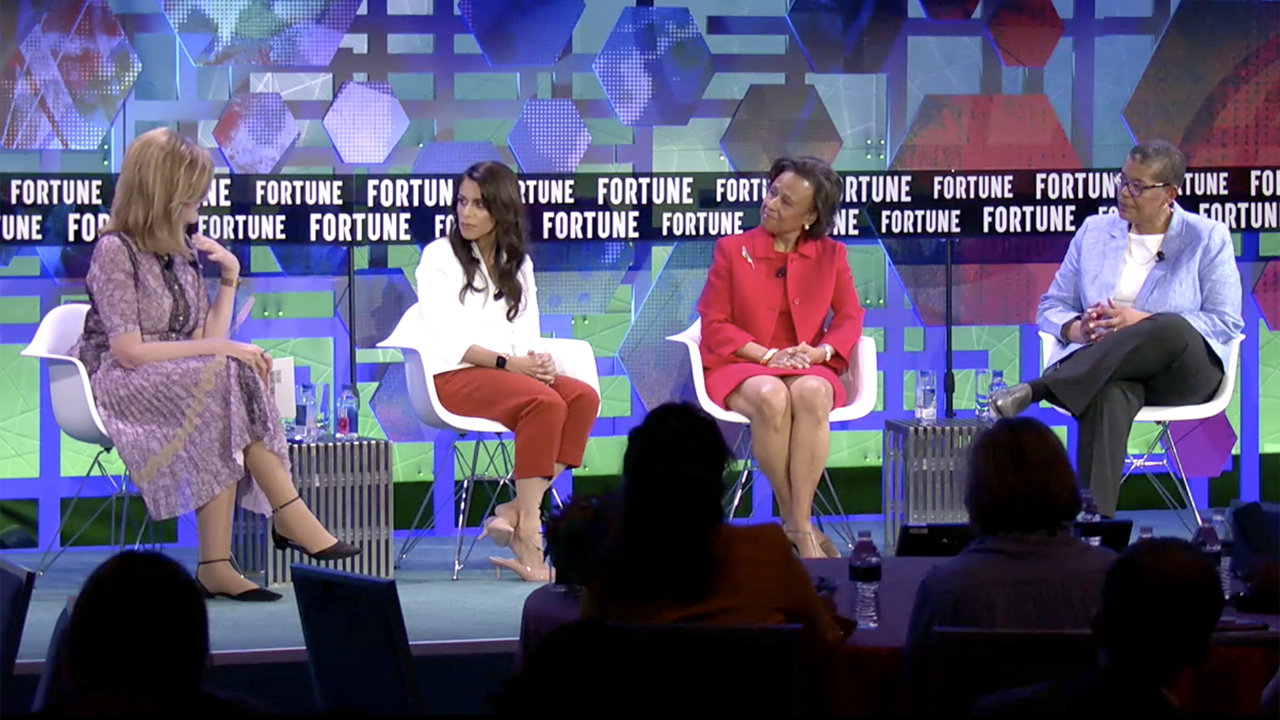
President Johnson Joins Conversation About Holistic Approach to Health
“The mental health crisis is real … and it was a crisis before the pandemic,” said Paula A. Johnson, president of Wellesley College, during the Redefining a New Era for Women’s Health panel discussion May 11 at Fortune’s 2022 Brainstorm Health conference. In a conversation with Michelle Williams, dean of the faculty of the Harvard T.H. Chan School of Public Health, and Sumbul Ahmad Desai, vice president of health at Apple, moderated by Arianna Huffington, CEO of Thrive Global, Johnson addressed two issues about which she is passionate: the mental health epidemic among young people and helping young women navigate ambitious careers without burning out.
“We are seeing skyrocketing rates of depression and anxiety in our young people, and starting at earlier and earlier ages,” said Johnson, who added that the pandemic has escalated this crisis. “We have to approach it like an epidemic, and we have to treat it like an epidemic.” She pointed out that we often tend to talk about “the mental health crisis” like it’s all one thing—but people ages 17 to 26 actually experience a large range of disorders, including schizophrenia, bipolar disorder, depression, and anxiety. “We’re not all monolithic,” said Johnson.
Our job is to provide not only an outstanding education, but an education that is holistic, which means that we in fact have to deprogram some of what has happened in their lives.
Paula A. Johnson, Wellesley College President
Taking a one-size-fits-all approach to treatment has been a long-standing issue in many aspects of health care. Williams pointed out that not until the 1990s was legislation passed requiring the inclusion of women and minorities in clinical studies—previously all medical recommendations were based on information gathered from white, male test subjects. “It goes back to the misperception that the female biological system is too complicated to engage in the research process,” said Williams. “As a result of this, there is a dearth of fundamental information that’s important in the development of therapeutics and preventive practices.” Williams has partnered with Desai to tackle this problem: Apple and the Harvard Chan School are working together to gather real-time health data from a large population of diverse women.
Johnson pointed out that studying what women and girls need—in terms of health care, caregiving support, the workplace environment, and mental health support—is the first step in being able to help them succeed. At Wellesley, Johnson said, many students arrive on campus with strong academic backgrounds but without much “life preparedness.”
“Our job is to provide not only an outstanding education, but an education that is holistic, which means that we in fact have to deprogram some of what has happened in their lives,” said Johnson. Focusing on relationship-building and self-care is key. “The idea here is really figuring out how to prepare young women for a whole life in which they’re going to enter the world,” said Johnson. “I think that holistic approach needs to start, quite frankly, in kindergarten, and needs to continue [after college] as we think about what women are looking for and need as they move into the workplace.”
The panel ended on a personal note, with Huffington asking the three panelists what they do to take care of themselves to help them manage their “stressful big jobs” and “huge responsibilities.”
Williams said she remembers to take time to breathe, and she also turns to her dog, Gidget, for comfort. Desai tries to stay active every day, going on nightly walks with her kids, and is also a “big believer in prayer, spirituality, and mindfulness.”
Johnson said that when she gets overwhelmed, she takes time to reflect on her “life of purpose” and why she is doing what she is doing. “Take a step back … and just remember why you’re there,” she said. She also takes the time to nurture her friendships and relationships. “The surgeon general has talked about an epidemic of loneliness,” Johnson said. “And our friendships take time. … Even with all of the intense work, I’ve really focused on making time for those relationships.”

